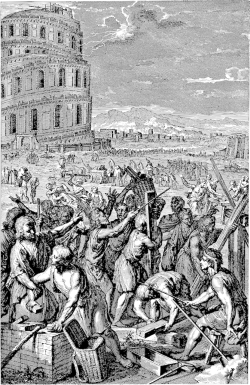Humans Begin Using Technology
As we continue our study of Biblical Anthropology, and specifically technology, we’re going to see how humans used technology, starting with the early days of our race.

Again, and we talked about this last time, very often when we talk about “technology” today we’re thinking about electronics and digital information. But on a basic level, technology for us as humans is simply the application of our knowledge in order to use God’s creation.
Abel used technology to construct his altar. His brother Cain used technology to build a city. Noah used technology to build the Ark. But let’s pause at a very interesting story in Genesis chapter 11. This is something that happened 42 or 43 centuries ago, a little after the Flood…
Now the whole earth had one language and the same words. And as people migrated from the east, they found a plain in the land of Shinar and settled there. And they said to one another, “Come, let us make bricks, and burn them thoroughly.” And they had brick for stone, and bitumen for mortar.
Genesis 11:1-3
There you are – technology. They are applying their knowledge. What are they going to do now?
Then they said, “Come, let us build ourselves a city and a tower with its top in the heavens, and let us make a name for ourselves, lest we be dispersed over the face of the whole earth.”
Genesis 11:4
Now, when Abel built his altar, it was for God’s glory. These people are building for their own glory. And what’s the problem with what they’re doing?
Quite simple – they’re planning to disobey God’s command to fill the earth (Genesis 1:28). No, they want to all stay together. Their plan is to glorify themselves, and create their own purpose (in contradiction of the Creator’s purpose).
And the LORD came down to see the city and the tower, which the children of man had built. And the LORD said, “Behold, they are one people, and they have all one language, and this is only the beginning of what they will do. And nothing that they propose to do will now be impossible for them. Come, let us go down and there confuse their language, so that they may not understand one another’s speech.”
Genesis 11:5-9
So the LORD dispersed them from there over the face of all the earth, and they left off building the city. Therefore its name was called Babel, because there the LORD confused the language of all the earth. And from there the LORD dispersed them over the face of all the earth.
God had created humans with incredible abilities. But if they came together and gained knowledge at such a rapid rate, “nothing that they propose to do will now be impossible for them”. That is, nothing evil. So God, in His mercy, divides the earth. He slows the progress of sin.
For although they knew God, they did not honor him as God or give thanks to him, but they became futile in their thinking, and their foolish hearts were darkened. Claiming to be wise, they became fools…
Romans 1:21-22
Dr. Peter Jones has called this “one-ism”. According to the world, the only thing that exists, or the only thing that is important, is the universe. We ignore the transcendent God and glorify ourselves, and the creation itself, as god; “…images resembling mortal man and birds and animals and creeping things.”
Instead of one-ism, two-ism knows the truth – that there is a Creation and a Creator. Two.
Or, instead of the word one-ism, we could say “scientism”. This is the belief that “science” is all that there is, or all that is important. Our knowledge, our technology, of this world. Science can resolve all of our problems and answer all of our questions eventually.
But thanks to God, and the imago dei, good technology is not lost completely. And in a sense, after the disaster of the Tower of Babel, we see technology redeemed many years later. Yahweh said to Moses: “…let them make me a sanctuary, that I may dwell in their midst. Exactly as I show you concerning the pattern of the tabernacle, and of all its furniture, so you shall make it” (Exodus 25:8-9).
God uses human technology – actually, a mix of human and divine technology – to glorify Himself. Humans return to using technology to glorify the Creator.
Within the limits given by God, people used their abilities and knowledge to build the tabernacle, and later the temple. Technology is always a cooperation between God and humans.
In fact, it’s interesting that when Samuel Morse (of the “Morse Code”) demonstrated the first long-distance telegram in the United States, the message that he sent was, “What God hath wrought!” – a quote from Numbers 23:23. All technology is cooperation with God in some sense.
Next time we’ll look at how we cooperate with God in technology, as we spend some more time in history.
